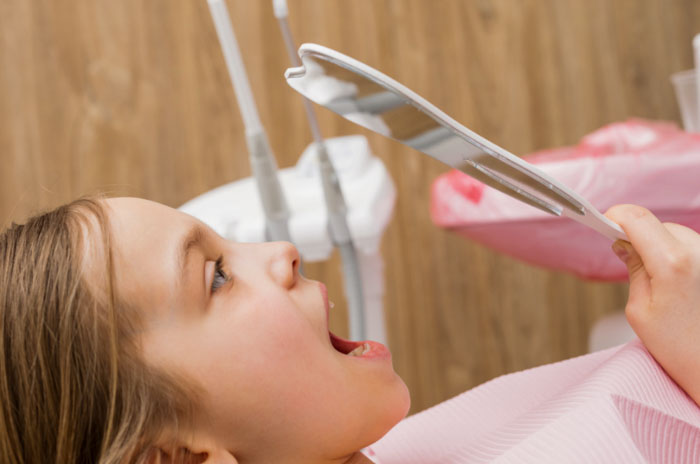Pediatric Dentistry Questions – FAQ Everything You Need to Know About Your Child’s Dental Care
Common Dental Questions for Your Children’s Dentist
If you are the parent of a young child, then you know that their oral health is essential. You want to make sure that they are getting the best care possible, and that means taking them to see an experienced pediatric dentist.
If you have never been to a pediatric dentist before, or if you have questions to ask about what they do, then read on! We will answer some of the best questions patients ask about pediatric dentistry services.

Why an Experienced Pediatric Dentist?
Children are not just small adults. They are not able to sit still for long periods of time, they may be afraid of the dentist, and their mouth is still developing. A pediatric dentist is specially trained to deal with all of these challenges.
Pediatric dentists have specialized training in caring for the oral health of children. They know how to put kids at ease, and they have experience dealing with the unique challenges that come with children’s teeth.
How is a Pediatric Dentist Different From Other Dentists?
In addition to the specialized training that they receive, pediatric dentists also have a different approach to care. They focus on preventative care and educate parents and children about good oral hygiene habits.
Pediatric dentists also have experience dealing with common childhood dental problems, such as cavities, thumb sucking, and teeth grinding.


Why Are Baby Teeth Important?
It’s easy to think of baby teeth as temporary and not worth taking care of. But that is not the case! They are important for a few reasons.
First, they help your child chew their food properly. They also hold space for the permanent teeth that are coming in. And finally, they help your child learn how to speak clearly.
When Should My Child See a Pediatric Dentist?
The American Academy of Pediatric Dentistry (AAPD) recommends that children see a dentist by their first birthday. But even if you have missed that milestone, it’s never too late to start going to the dentist!
This helps them get familiar with the dentist’s office, and it also allows the dentist to keep an eye on your child’s oral health.

What Services do Pediatric Dentists Offer?
Pediatric dentists offer a wide range of services, from preventive care to complex dental procedures. If you cannot find everything you like, please ask the Dr. We are always happy to help our patients make the best choices before their dental care appointment.
- Regular checkups and teeth cleanings – Preventive care is key, and pediatric dentists know that. They will check your child’s teeth for cavities and other problems at every visit, and they will clean them to help keep them healthy.
- Fluoride treatments – Fluoride is a mineral that helps to prevent cavities. Pediatric dentists may recommend fluoride treatments for your children if they are at high risk for cavities.
- Sealants – Sealants are a thin coating of plastic that is applied to the chewing surfaces of the back teeth. They help to protect the teeth from cavities and tooth decay.
- Cavity fillings – If your child does get a cavity, the dentist will fill it using a tooth-colored material. This will restore their tooth to its original shape and function.
- Tooth-Colored Fillings – If your child has a cavity that is on the biting surface of one of their molars, the dentist may recommend a tooth-colored filling. This type of filling is made from a resin that matches the color of your child’s teeth.
- Pediatric Crowns – If a tooth is severely decayed, the pediatric dentist may recommend a crown. A crown is a “cap” that covers the entire tooth. It restores the tooth to its original shape and size, and it protects it from further damage.
Now that you know more about pediatric dentistry services, you will find that you can make an informed decision about your child’s oral health care.
Are Fillings Really Needed for Baby Teeth?
The short answer is, yes! Baby teeth are just as susceptible to cavities as permanent teeth. In fact, untreated cavities in baby teeth can lead to problems with adult teeth.
Cavities in baby teeth can cause pain and infection. They can also affect the way your child speaks and eats. And if they are left untreated, they can lead to cavities in the adult teeth.
So if your child has a cavity, it is important to have it filled by a pediatric dentist.
How Should I Clean My Baby’s Teeth?
You should start cleaning your baby’s teeth as soon as they come in. You can use a soft, wet cloth to wipe their teeth and gums. As they get older, you can start using a toothbrush.
It is important to use a toothbrush that has soft bristles. And you should only use water – no toothpaste! Toothpaste can be harmful to young children.
You should brush your child’s teeth for two minutes, twice a day. And don’t forget to clean in between their teeth using a flossing motion!
How Can Parents Prevent Tooth Decay?
Parents can do many things to help prevent tooth decay in their children. Some of the most critical include:
- Cleaning between their teeth using floss or an interdental cleaner.
- Taking them for a regular dental appointment and cleaning.
- Providing them with the best healthy diet that includes plenty of fruits and vegetables.
- Limiting sugary drinks and snacks.
If you follow these tips, you can help your child have a healthy smile for life!
When Should My Child Start Using Toothpaste?
The age you can start using toothpaste on your child’s teeth as soon as they are able to spit it out. This is usually around the age of two or three.
When you first start using toothpaste, you should use a pea-sized amount. And you should make sure that your child spits it out after brushing.
You should continue to use toothpaste with your child until they are able to brush their teeth on their own. At that point, you can switch to a toothbrush that has no toothpaste.
Is My Child Getting Enough Fluoride?
Fluoride is a mineral that helps to prevent cavities. It is found in many foods and drinks, as well as in toothpaste and mouthwash.
Your child should get enough fluoride from their diet. But if they are at high risk for cavities, the pediatric dentist may recommend additional fluoride treatments.
These treatments can help to prevent cavities and keep your child’s teeth healthy.
For more answers to questions about pediatric dentistry services, be sure to contact us today! We would be happy to help you and your child get the dental care that you need.
*Required Field
Do You Have Any More Dental Questions?
We have covered many common dental questions here, including child oral health, child pediatric dentist, child dental health, pediatric dentistry orthodontics, child baby teeth, and much more. Our Dr. provides the best dental care to children and looks forward to the first appointment with our new children, no matter what their age!
Call us today at 713-241-6166 to ask additional questions and make your first appointment!
Return to the Monroe Pediatric Dentistry page.
